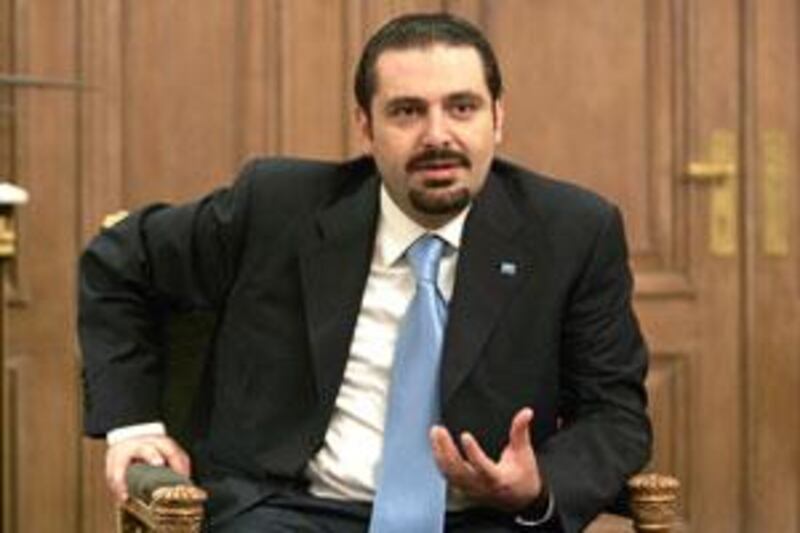BEIRUT // The fight over the formation of a national unity cabinet by the prime minister designate Saad Hariri yesterday shifted from confusion over the possible defection of a key majority ally to demands by Christian members of the opposition for key ministries, a stance strongly opposed by the majority.
After spending a week on holiday and deciding that the departure of the Druze leader Walid Jumblatt from the so-called "March 14" alliance that won in June's parliamentary elections did not mean Mr Jumblatt's votes would go to the Hizbollah-led opposition, Mr Hariri returned to managing the egos and demands of Lebanon's Christian parties, both those aligned and opposed to March 14. "I have adopted two approaches since the start of the government formation process," Mr Hariri said after the meeting at Baabda Palace with the president, Michel Suleiman.
"The first is not to allow the ongoing disputes to impact the economy and tourism and the second is to avoid making statements in order not to be dragged to situations from which there is no turning back," he told reporters. Mr Hariri described as "natural" ongoing arguments over cabinet portfolios. "The distribution of portfolios and ministerial nominations require calm dialogue, which is the way that will help eliminate obstacles," he said.
The Kata'eb leader Amin Gemayel, a Maronite Christian allied with Mr Hariri's mostly Sunni Future Movement party, accused the opposition of using intimidation to stall the formation of a government and cited the May 2008 sectarian clashes that saw the opposition take temporary control of Beirut. "We are not only facing a constitutional crisis, but also a political, financial and economic crisis," Mr Gemayel told a news conference in his home village of Bikfaya.
The opposition, he said, "are acting as winners and trying to enforce their objectives on the winning team. We have the impression that the logic of May 7 is still dominating the logic of June 7." Mr Gemayel, who served as president during the 1980s civil war, called upon his Sunni allies to respect the unofficial conventions that offer Christians nearly equal representation in the government despite the Muslim majority in Lebanon.
"If need be the opposition shares should be divided equally among Muslims and Christians and Muslims as well as March 14," he said. "We want half the Christian seats." Although the heated rhetoric by his Christian allies is complicating the efforts, a member of parliament from Mr Hariri's party said the real issue are Christian opposition parties, namely that of former general Michel Aoun, who is demanding that his son-in-law be allowed to continue as telecommunications minister, while also promoting agendas of regional neighbours.
Both Saudi Arabia and Syria, supporters of the majority and minority, respectively, have been negotiating improved relations in a situation that many Lebanese interpret as foreign domination of their political process. "I think the reason for the delay is some regional demands and obstacles," said MP Khalid Al Daher, a member of Mr Hariri's Future Movement. "Some big regional players are still waiting and pushing through their allies here in Lebanon to block the formation. Some opponents here in Lebanon also have personal demands or family demands. We are in a time where people are putting their family's interest before the national interest."
The son-in-law in question, Jibran Bassil, strongly denied that nepotism played a role in his party's intransigence. "It is natural for us to name our ministers. We don't put conditions on any team and we can't accept that any side puts conditions on us," Mr Bassil said yesterday. "The opposition has agreed that each side names its own ministers." Mr Aoun said yesterday that he could not compromise on the issue, because it would embarrass him in front of his enemies, a common reason for political positions in Lebanon that is rarely admitted in public.
Mr Aoun insisted during an interview with Lebanese television that Mr Bassil be given a portfolio in the new government "since the [March 14] stance taken from this issue has become a challenge, and if I abandon this demand, they would say I gave up under pressure". Mr al Daher responded angrily, arguing that Mr Aoun's ego and ties to foreign governments such as Syria are exploiting Lebanon's dire need for stability.
"Aoun just needs to stop the blackmail knowing that it's a crucial period now," he said. "[He] is being unfair and unrealistic, favouring family interests over national interests. If his high demands remain the same, the country will remain paralysed. Aoun is so desperate that he is playing on Christian sentiments, saying that Christians are not represented well. I think Aoun and others who are being an obstacle in the formation did not get their regional orders yet to facilitate the new government."
mprothero@thenational.ae





